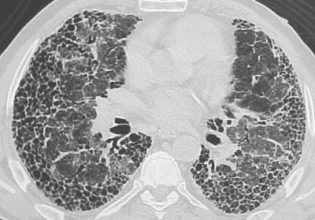Idiopathic pulmonary fibrosis (Lung scarring)
What is idiopathic pulmonary fibrosis?
— Idiopathic pulmonary fibrosis (also called “IPF”) is a lung disease that makes it hard to breathe. It damages the air sacs in your lungs that send oxygen to the blood. This damage causes the lungs to be stiff. It also makes it hard for oxygen to reach the blood. This makes people with IPF cough and get short of breath.
People who get IPF are usually older than 50. It is a very serious illness that cannot be cured and gets worse over time. In some people, IPF can stay stable for several years before getting worse, or get worse gradually. But in others it gets worse more quickly.
Why did I get idiopathic pulmonary fibrosis?
— Doctors do not know exactly how IPF starts. The risk of IPF is greater for people who:
- Smoke or used to smoke
- Have breathed in a lot of toxic chemicals or pollution
- Have breathed in certain types of dust at work, over a long time
- Have family members with pulmonary fibrosis
What are the symptoms of idiopathic pulmonary fibrosis?
— IPF can start very slowly, so it might not cause any symptoms at first. When it does, symptoms can include:
- Shortness of breath during exercise or other physical activity
- Dry cough
Are there tests for idiopathic pulmonary fibrosis?
— Yes. Doctors can do:
- Blood tests to make sure you don’t have a different type of lung disease – There is no blood test for IPF.
- Breathing tests to see how well your lungs are working – Breathing tests can show if your shortness of breath is caused by IPF or another disease such as emphysema.
- An imaging test called a “CT scan” – This test uses a special X-ray to create pictures of the inside of the body. It can show lung damage caused by IPF.
- If the doctor is not sure you have IPF after the CT scan, he or she might do a lung biopsy. In this test, a doctor does surgery to take a small sample of tissue from your lung. Another doctor looks at the sample under a microscope for signs of IPF.
How is idiopathic pulmonary fibrosis treated?
— There is no treatment to cure IPF. It usually gets worse slowly. But doctors can treat some of the symptoms. These treatments can include:
- Quitting smoking – If you smoke cigarettes, the most important thing you can do is stop smoking.
- Flu and pneumonia vaccines – You should get the flu shot every fall and the pneumonia vaccine at least once. Infections like the flu and pneumonia can hurt your lungs. It’s important to try to prevent them.
- Oxygen – As IPF gets worse, some people need to breathe oxygen from a tank they carry with them.
- Pulmonary rehab – In pulmonary rehab, people learn exercises and ways to breathe that can help with IPF symptoms.
- Medicine – Two medicines, have been shown to slow lung damage. But they do not cure IPF.
- Treatment for acid reflux – Acid reflux is when the acid that is normally in your stomach backs up into your esophagus. The esophagus is the tube that carries food from your mouth to your stomach. People who have acid reflux might need medicine to stop the acid reflux from making IPF worse.
- Lung transplant – This is surgery to replace 1 or both diseased lungs with healthy lungs. It is done only if a person with IPF meets certain conditions.
IPF sometimes gets worse very quickly, over a few days to weeks. If this happens, you should tell your doctor. Doctors can try to treat it with antibiotics and steroid medicines. (These are not the same as the steroids some athletes take illegally.)

